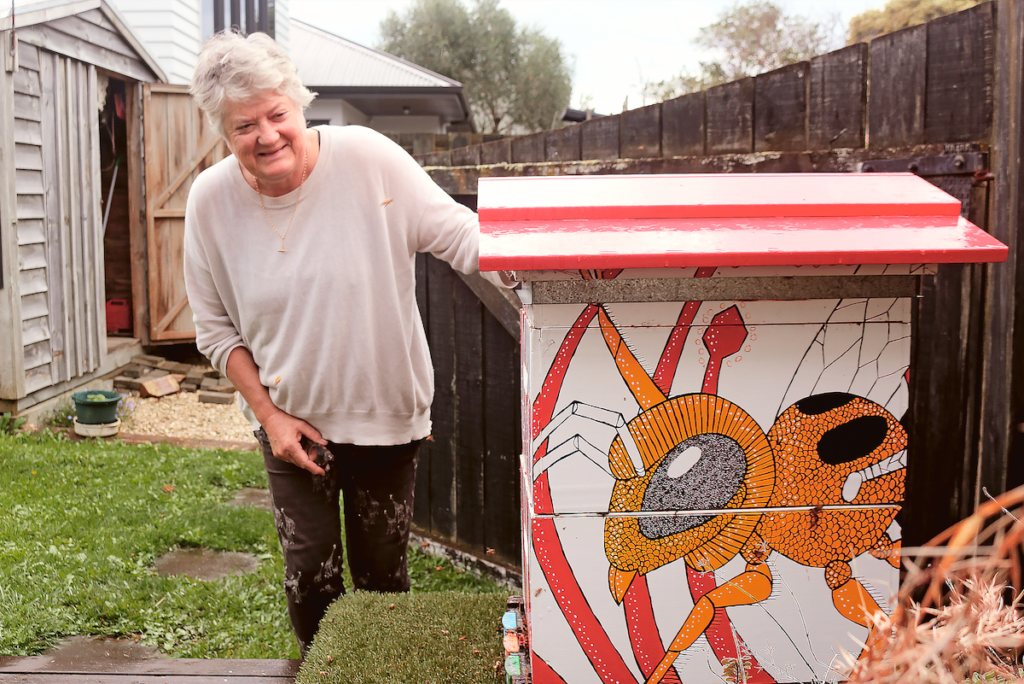What's New
16 June, 2022
Projects and bees give volunteer wrangler a buzz
Anne McMillan has had higher-powered jobs, but loves working alongside other volunteers on grassroots environmental projects. She tells Helen Vause about the pleasures of her local role.

It’s the rhythms of nature that drive the working schedule most days for Anne McMillan.
Where once she worked in high-powered positions, her agenda these days often sees her in gumboots up to her ankles in mud.
At 66, McMillan is loving her reinvention as a core member of the team overseeing the work of Restoration Takarunga Hauraki, coordinating and working alongside groups of volunteers on projects in local forests, wetlands and streams.
On the morning the Flagstaff sits down with her, she’s already made a dash to the nursery off Mt Cambria Reserve where an earlier downpour has filled an overhead canopy, threatening the precious potted seedlings underneath with a damaging deluge of water. Crisis averted, she’s barely back home when the bee keepers, all kitted out in protective gear, hove into sight to tend a beehive outside her living-room window.
“Bees are lovely pets,” says McMillan who was previously allergic to the little creatures but has become desensitised to them.
Living in tune with nature, in the urban heart of the peninsula, is a happy fit for McMillan, though the pathway to this stage of her life and work has taken many turns.
Back in the 1970s, she left high school in Rotorua for Palmerston North and Massey University. With a degree in IT and maths, she headed to Wellington to work on and later manage the Bankcard (later Mastercard) system. Going the extra mile in that job meant being on call 24/7, whenever glitches hit the system.
“In that era I was working at the coal face in IT, and that included designing systems. It was actually quite creative,” she says. “But also it was very full on.”
Married and with a family, she moved back to Rotorua and worked in IT roles on aviation and forestry systems.
Always with an eye to the environment, long before it became the focus of her ‘day job’, McMillan was regularly out in nature cycling, running, walking and planting trees.
“I’d go along with the guys when they went out duck shooting and I’d be out planting trees.”
McMillan is an insulin-dependent diabetic and she says exercise and fitness has always been an important part of living well. “I’m lucky I’ve always had a ton of energy and I’ve always been able to give a hundred percent to whatever I’m doing.”
For her 50th birthday it would have been no surprise to those close to her that McMillan decided she’d celebrate over the year by knocking off the peaks of the highest maunga around the region.
Kicking off her birthday challenges, she hiked to the top of Mt Taranaki on her own and marked it off the list. Next up she recounts getting out of bed at dawn one morning in Rotorua, driving to the skifields, hopping onto a chairlift and then hiking up to the top of Ruapehu. On another day hike she reached the summit of Tongariro.
But just getting to Mt Makorako, the last peak on her list, was a more challenging exercise on her milestone birthday celebration plan. Makorako is a 1727-metre peak amidst the gnarly Kaimanawa Ranges. To start her climb, McMillan had to make a two-day hike through dense forest, overnight in a hikers’ hut and then bushwhack and scramble her way to the top, again on her own and well off the beaten track.
“I was always very confident that I could do it,” says McMillan. “They were fantastic trips.” Her 60th was celebrated ballooning.
McMillan had no trouble mustering the energy to change direction professionally and retrain through postgraduate study for a new career in early childhood education.
In 2015, she moved with her family to Devonport to be closer to her mother, Maureen, who is now a Ryman village resident.
She worked in early childhood education until Covid lockdowns grounded her at least temporarily.
It was time for a change of pace and a new direction. McMillan didn’t have to look far for a new passion and a calling where her skills and work ethic would be of great value. She’d noticed a neighbour out pulling weeds in Achilles Reserve, and she’d already come across Lance Cablk, the coordinator of Restoring Takarunga Hauraki.
The group and the work Cablk talked about sounded like something she would like to be part of.
McMillan joined and loved what she discovered. She also saw there was heaps to do in the group’s ambitious, multi-stranded plan to protect, restore and replenish the local natural environment.
In short time, she stepped up to a bigger role. These days, about 60 people are on McMillan’s list for a regular email from her, detailing what’s coming up and the many bits of information needed to keep volunteers up with current work.
Sometimes they look like a little conservation army of predominantly seniors, now well established on a range of projects and making an obvious difference to our landscapes. Other times, says McMillan, they feel like just a handful of workers in need of reinforcements.
Her group are out on Monday mornings and Fridays, along with late afternoons on Wednesdays and many one-off events, along with time working at the nursery, where about 5000 seedings await planting.
The team working with her can be found at any one of a number of sites – Kawerau Reserve, Philomel Cres, Achilles Reserve, ‘Polly’s Park’, Jutland Reserve, O’Neill’s Point, or in Seabreeze Rd, planting along the edge of the golf course.
“It’s hard to beat being out in nature any day of the week, with a group of great people, feeling like you are making a difference and listening to the tui sing.”
Anne McMillan
They’re out working in most weather, gloved up and armed with hand tools to tackle anything from easy weeding and planting to the bigger jobs that need plenty of huff and puff.
They’re to be seen gathering for a cup of tea and a natter during most sessions.
“People don’t have to be very fit or strong. But some do love the chance to get really stuck in. I love getting into the privet and the pest plants and getting them out,” says McMillan.
“Some of the men who come from Rymans absolutely love the chance to get into a bit of physical work and really work hard with saws and shovels.
“Some of our team have downsized from big gardens or from farms and this is their chance to get out and work on the land around them.
“It’s terrific for your health and that’s the feedback I get from a lot of the volunteers who have really put themselves into this work.”
And when they lift their heads and look around they can see the difference they’ve been making across the peninsula in recent years, she says.
“We’re getting positive feedback,” says McMillan.
“But sometimes I feel this work is undervalued.”
She likes being busy and involved. “It’s hard to beat being out in nature any day of the week, with a group of great people, feeling like you are making a difference and listening to the tui sing.
“I’ve always been a big advocate of volunteering and being part of a real contribution. Volunteering gives back too – people can learn so much, feel a sense of purpose, get connected with their communities and make new friends.”

Please consider supporting The Devonport Flagstaff by clicking here:
